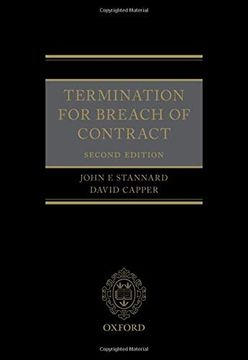Reseña del libro "Termination for Breach of Contract (en Inglés)"
Providing a comprehensive and detailed treatment of termination as a remedy for breach of contract, this book gives a current account of the law and explains this complex area in a practical context. This book is divided into four parts. The first section sets out to analyse what is involved in termination and looks at some of the difficulties surrounding the topic, before going on to explain the evolution of the present law and its main principles. The second section provides a thorough analysis of the two key topics of breach and termination. Breach is defined in terms of a failure, without good excuse, to perform an obligation under the contract, and the various aspects of this definition are explained in the light of the relevant authorities. The chapter on breach of contract has continued to take on board the developing principles of contractual construction, most notably in relation to the interpretation of exemption clauses, where Supreme Court and Court of Appeal decisions, namely Impact Funding Solutions Ltd v Barrington Support Services Ltd and Persimmon Homes Ltd v Ove Arup and Partners Ltd, have continued to question the extent to which the traditional approach can be reconciled with the broader canons of commercial construction now adopted by the courts. In the following chapter, termination is defined in the terms of an election by the promisee, in consequence of a breach by the promisor, to claim discharge from his or her own primary obligations under the contract. This process, which can also be seen as a major contractual remedy in its own right, is distinguished from other processes with which it has a close relationship, most notable the right to withhold performance and discharge under the doctrine of frustration. The controversial decision of the Court of Appeal in MSC Mediterranean Shipping Co SA v Cottonex Anstalt is discussed here. The third part addresses the question when the right to terminate for breach arises. The law gives two answers to this question - when the term broken is classified as a 'condition' of when a 'fundamental' breach has occurred. The nature of a 'condition' in this sense is explained, and the criteria for identifying when a term should be classified as such is set out. Similarly, the criteria for identifying a fundamental breach is discussed, as is the difficult relationship between the concepts of fundamental breach and repudiation and the doctrine of anticipatory breach. Recent Court of Appeals decisions are included, such as Spar Shipping AS v Grand China Logistics Holding (Group) Co Ltd, which provides useful guidance as to the relationship between conditions and contractual rights of termination. The fourth and final section considers the consequences of the promisee's election whether to terminate. In this section the legal effects of termination with regard to the obligations and remedies available to the promisee and the promisor, and also its effect on the application of other terms in the contract such as exemption clauses, are analysed. The measure of damages available to the promisee following termination, most notable damages 'on the footing of repudiation' or damages for 'loss of the bargain' is also considered here alongside other general principles governing damages in this context. The position on damages in The Golden Victory has been extended further by Bunge SA v Nidera BV as discussed in Chapter 10. Similarly the examination of the Court of Appeal decision in The New Flamenco provides additional authority on mitigation to damages. Principles relating to restitution recovery are re-examined by reference to three major Supreme Court cases on unjust enrichment: Benedetti v Sawiris; Memelaou v Bank of Cyprus UK Ltd; and Investment Trust Companies v Revenue and Customs Commissioners.

